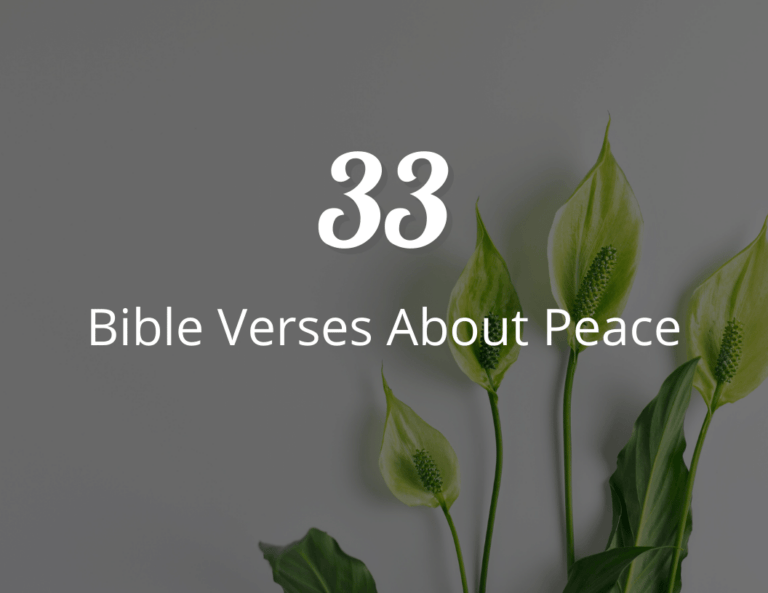Living in peace and harmony is something that we all aspire to, yet it can be so difficult to achieve. Fortunately, the Bible provides us with some clear guidance on how we can live in peace and harmony with each other – through verses such as Philippians 4:7, Romans 12:17-18, Hebrews 12:14 and Colossians 3:12-15.
In this article, we’ll examine these Bible verses in detail to help you understand what they mean for your life today. We’ll explore how these scriptures can bring peace and joy into our lives by showing us how we should act towards one another.
Philippians 4:7
Philippians 4:7 encourages us to remain content in whatever situation we’re in, and find joy no matter the circumstances. In this verse, Paul is reminding us of the importance of upholding unity and releasing stress by being content with our current situations.
He calls for patience and trust that God will work out our problems. This is a powerful reminder that we should be careful not to let our emotions take over, and instead focus on finding peace within ourselves through acceptance of our circumstances.
By doing so, we can foster an environment of love and harmony which will help bring peace into our lives. With this in mind, Romans 12:17-18 further emphasizes the importance of living in peaceful harmony with one another.
Romans 12:17-18
Caringly concocting concord, Romans 12:17-18 calls us to connect with compassion and civility.
The scripture reads: ‘Repay no one evil for evil, but give thought to do what is honorable in the sight of all. If possible, so far as it depends on you, live peaceably with all.’ (ESV).
Practicing forgiveness and seeking reconciliation are essential components of this passage – qualities that can be difficult to practice in times of strife or anger.
As such, we must strive to embody these virtues despite the difficulty they may present.
By actively engaging in this behavior, not only will we honor God’s word but also demonstrate a desire to serve others; thus promoting peace and harmony throughout our lives and communities.
With these concepts in mind, it’s now time to look at Hebrews 12:14.
Hebrews 12:14
You’re called to pursue holiness, as Hebrews 12:14 states: ‘Strive for peace with everyone, and for the holiness without which no one will see the Lord.’
Living in peace and harmony requires a peaceful attitude towards others, harmonious relationships with those around you, and respect for all. To achieve these things, it’s important to be mindful of how our words and actions can affect those around us.
Having an open heart and mind when dealing with others is key in creating positive relationships that foster a sense of peace and harmony. Additionally, being willing to forgive both ourselves and others is essential in living peacefully.
By striving for these goals every day, we can live in peace and harmony according to God’s will as set forth in Hebrews 12:14.
As we turn our focus towards Colossians 3:12-15, we must remember the importance of pursuing holiness through peaceful attitudes towards others.
Colossians 3: 12-15
Focusing on Colossians 3:12-15, we must remember the importance of cultivating holiness through loving attitudes towards others, so that our lives may truly shine with God’s radiant grace.
This passage reminds us to clothe ourselves in compassion, kindness, humility, gentleness and patience. We should bear with one another and forgive each other as God has forgiven us.
These attitudes foster spiritual harmony between believers and help create an environment of peace and understanding in our homes and communities. Living peacefully is a sign of devotion to God; it reflects His unconditional love for us when we choose to show this same love to those around us.
Frequently Asked Questions
What other scriptures can I read to learn more about living in peace and harmony?
In order to live in peace and harmony, it’s important to strive for balance and unconditional love.
Seeking a lifestyle that reflects these values can be difficult, but it’s essential for creating an environment of understanding and respect.
It requires looking beyond our own needs and wants, and putting others first.
To learn more about how to achieve this balance, one should look towards scriptures that emphasize the importance of selflessness and empathy.
By reading such scriptures, we can gain insight into how to create a peaceful atmosphere in our lives through meaningful relationships with those around us.
How can I practically apply the bible verses to my life?
You can apply bible verses about living in peace and harmony to your life by taking a few meaningful steps.
Practicing meditation and mindfulness is an excellent way to start, as it allows you to focus on the present moment without judgement or interference from outside sources.
Additionally, paying attention to your listening skills is essential; actively listen during conversations with others, thinking of how their words might help you learn more about peaceful and harmonious living.
Finally, use symbolism within your own life- if there’s a situation that causes unrest for you, try and think of an object or image that represents peace for you- maybe a quiet lake or a field of flowers- and use it as motivation when circumstances become difficult.
By combining all these techniques together, you can practically apply bible verses about living in peace and harmony to your life.
How does living in peace and harmony benefit my relationships?
Living in peace and harmony with others can have a profound impact on your relationships. When you choose to be encouraging rather than critical, your interactions become more meaningful and beneficial for both parties.
Self-reflection is key to understanding why conflicts arise and how they can be avoided in the future. It can also help you develop empathy towards others, allowing you to take on their perspective without judgment or criticism.
Taking time to practice these skills will result in deeper connections with those around you, leading to stronger bonds that’ll last over time.
What is the difference between peace and harmony?
You may have heard the terms ‘peace’ and ‘harmony’ used interchangeably, but they actually have different meanings.
Peace is the absence of conflict or war, whereas harmony is a state where everyone works together cooperatively and amicably.
For example, when two parties are in disagreement over a certain issue, peace can be achieved by one side giving up their position in order to end the fight.
On the other hand, harmony requires both sides to forgive each other and reconcile their differences before finding common ground.
In order for true harmony to exist, it’s important that there is forgiveness and reconciliation between all involved parties.
When this happens, people can live in peace and harmony simultaneously which ultimately leads to better relationships with those around them.
How can I find inner peace?
Finding inner peace requires balance and cultivating joy. To do so, it’s important to recognize the present moment and be mindful of all that’s around you.
Consider what brings joy to your life and make sure to prioritize these activities in your daily routine. Also, practice self-care. Make time for yourself even when there are many demands on your attention.
Take a few moments each day to sit quietly with yourself—meditate, journal, or take a walk in nature—and allow yourself the space to relax and recharge. With a balanced lifestyle of both self-care and joyful activities, you can discover inner peace within yourself.
Conclusion
You’ve read the verses and now you know that living in peace and harmony is possible.
Through Philippians 4:7, Romans 12:17-18, Hebrews 12:14, and Colossians 3:12-15, we can learn how to live peacefully with each other.
It’s amazing how these verses all coincide to show us that living together harmoniously is achievable.
The key is understanding that everyone has their own needs and beliefs; it’s important to respect them while also working towards common goals.
With this knowledge, you can make a difference in your community by choosing peace and harmony over conflict!

